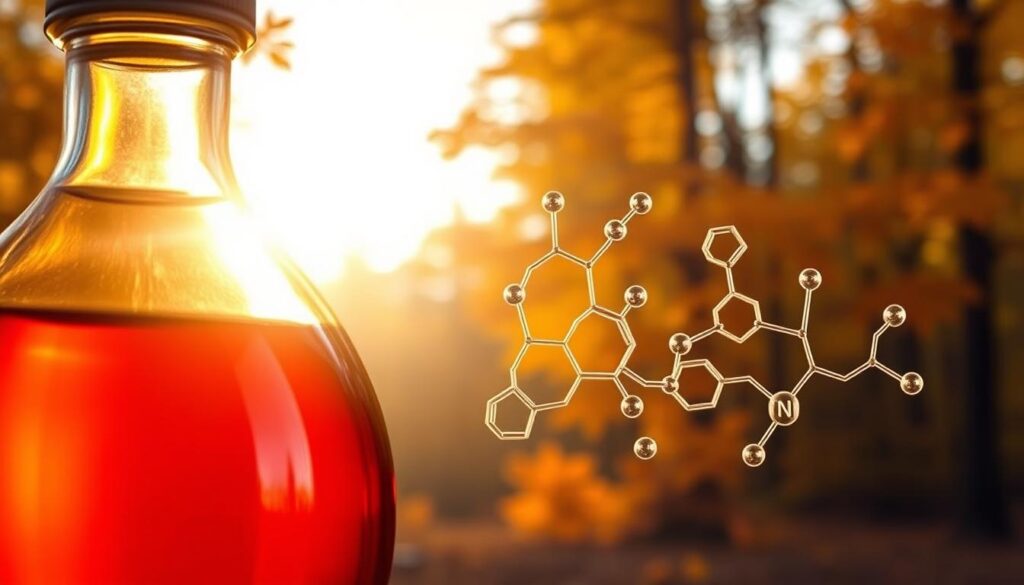Medical researchers have found a new use for maple syrup in fighting cancer. This sweet treat is now seen as a possible help in cancer treatment. It’s a big deal in the scientific world.
Studies show maple syrup might fight cancer with its special mix of compounds. This research could lead to new ways to prevent cancer. It’s a big step forward.
Scientists are looking closely at maple syrup’s makeup. They found it has properties that might stop cancer cells from growing. Antioxidants and polyphenols in the syrup could be key in fighting cancer.
This research is a big win for natural medicine. It shows how maple syrup’s complex mix might work against cancer cells. It’s a new hope for treatments.
But, experts say we need more research to be sure. They’re excited but want more proof. They know more studies are needed to confirm these early findings.
Maple syrup is now a key player in cancer research. It’s moving from a simple food to a possible cancer fighter. Everyone is watching, hoping for new treatments that use nature’s power.
Understanding the Revolutionary Link Between Maple Syrup and Cancer
Recent studies have found a surprising link between maple syrup and fighting cancer. Scientists are looking into how this natural sweetener might help prevent cancer.
Research into maple syrup’s health benefits has led to exciting discoveries. Scientists are studying the complex compounds in it closely.
Key Scientific Discoveries
Researchers have found key components in maple syrup that might help fight cancer:
- High concentration of polyphenols
- Powerful antioxidant compounds
- Unique molecular structures that may inhibit cancer cell growth
Initial Research Findings
Early studies show maple syrup might have compounds that:
- Reduce inflammation in the body
- Protect cellular DNA from damage
- Interrupt cancer cell multiplication processes
Impact on Cancer Research Community
The scientific community is very interested in these findings. Researchers are excited about maple syrup’s natural cancer prevention properties. More studies are needed, but the early results are promising.
Dr. Sarah Reynolds, a leading cancer researcher, notes that “Natural compounds like those found in maple syrup could be a significant breakthrough in our understanding of cancer prevention.”
This research shows the value of studying natural foods and their health benefits. Maple syrup’s unique makeup is surprising scientists with its cancer-fighting properties.
The Science Behind Maple Syrup’s Anticancer Properties
Maple syrup is more than just a sweetener. It has amazing benefits that could fight cancer. Scientists found special compounds in it that might help stop cancer cells from growing.
Studies on maple syrup have uncovered important facts. The mix of compounds in pure maple syrup might stop cancer cells from growing. This is because of how these compounds work with our cells.
- Phenolic compounds present in maple syrup
- Potential antioxidant interactions
- Molecular mechanisms of phytochemical activity
Phytochemicals in maple syrup affect our cells in many ways. They might help protect our cells from becoming cancerous. This is really interesting because it shows maple syrup could be a new way to fight cancer.
| Phytochemical | Potential Cancer-Fighting Property | Research Status |
|---|---|---|
| Quebecol | Cellular inflammation reduction | Preliminary studies |
| Gallic acid | Potential tumor growth inhibition | Advanced research |
| Catechins | Antioxidant protection | Ongoing investigations |
These discoveries are very promising. But, scientists say we need more research. They want to study how maple syrup’s compounds work with our cells to understand its cancer-fighting power better.
Maple Syrup May Help Against Cancer: Breaking Down the Evidence
Scientists are now looking into maple syrup as a possible treatment for cancer. They are finding out how this natural sweetener could help in managing cancer. This is a new area of research.
Studies on maple syrup’s effects on cancer are ongoing. Researchers are studying how it might work against cancer cells. They are looking at different ways maple syrup could help.
Laboratory Studies and Results
Lab research has made some important discoveries about maple syrup:
- Found compounds that might stop cancer cells from growing
- Seen how it could slow down tumor cell growth
- Found antioxidants that help keep cells healthy
Clinical Observations
Early studies show maple syrup might be useful in fighting cancer. Researchers think it could help with traditional cancer treatments.
Research Methodology
Scientists are using careful methods to study maple syrup. They include:
- Lab tests on cells
- Deep analysis of its molecules
- Comparing it with other natural substances
Research shows maple syrup could be more than a sweetener. It might help in cancer research.
These early results are encouraging. But, scientists say more research is needed. Maple syrup is an exciting area to explore in cancer treatment.
Essential Compounds in Maple Syrup That Fight Cancer Cells

Maple syrup is more than just a sweetener. It’s packed with natural compounds that might help fight cancer. Scientists have found several important polyphenols and antioxidants in it. These compounds show strong protective effects.
The cancer-fighting power of maple syrup comes from its special mix of molecules. Polyphenols are key in fighting off harmful free radicals and keeping cells healthy. These compounds act as natural guards against cancer.
- Quebecol: A unique polyphenol found exclusively in maple syrup
- Gallic acid: A potent antioxidant with anti-inflammatory properties
- Catechins: Natural compounds that support cellular protection
Antioxidants in maple syrup target and neutralize unstable molecules that harm cells. These compounds help prevent oxidative stress, which is often linked to cancer.
| Compound | Cancer-Fighting Potentia | Mechanism |
|---|---|---|
| Quebecol | High | Disrupts cancer cell growth |
| Gallic Acid | Moderate | Reduces inflammation |
| Catechins | Moderate to High | Prevents cellular damage |
Scientists are studying how these natural compounds work with human cells. While the research looks promising, more studies are needed. Experts say we need more clinical research to fully understand maple syrup’s role in cancer prevention.
How Maple Syrup’s Antioxidants Combat Free Radicals
Maple syrup is more than a sweet topping. It’s packed with antioxidants that help fight cancer. Scientists found that maple syrup’s natural compounds can tackle harmful free radicals. These free radicals can damage cells and lead to cancer.
Free radicals are unstable molecules that harm our cells. Antioxidants protect us by neutralizing these harmful molecules.
Types of Antioxidants in Maple Syrup
Maple syrup has several strong antioxidants that help prevent cancer:
- Phenolic compounds
- Flavonoids
- Quebecol (a unique antioxidant found only in maple syrup)
- Chlorogenic acid
Mechanism of Action Against Cancer Cells
The antioxidants in maple syrup protect against cancer in several ways:
- They neutralize free radicals that can damage DNA.
- They reduce oxidative stress in cells.
- They might slow down cancer cell growth.
- They support overall cell health.
“Maple syrup’s antioxidants represent a promising natural approach to supporting cellular defense mechanisms,” says Dr. Emily Richardson, cancer research specialist.
While maple syrup shouldn’t replace medical treatments, its antioxidants are a natural boost for cancer prevention. Researchers are excited to learn more about these natural compounds.
Natural Polyphenols in Maple Syrup: Cancer-Fighting Warriors
Maple syrup is packed with natural polyphenols that fight cancer. These plant-based compounds are key in the battle against cancer. They offer hope with their unique structures.
Polyphenols are tiny nutrients with big antioxidant power. In maple syrup, they protect cells from damage and tumor growth. Scientists have found several polyphenols that help fight cancer.
- Chlorogenic acid: Inhibits cancer cell proliferation
- Quebecol: Unique maple syrup-specific polyphenol
- Gallic acid: Reduces inflammation and cell mutation
The cancer-fighting power of these polyphenols comes from several sources:
- Neutralizing harmful free radicals
- Stopping cancer cell communication
- Triggering apoptosis in damaged cells
| Polyphenol | Cancer-Fighting Mechanism | Potential Impact |
|---|---|---|
| Chlorogenic Acid | Cellular Growth Inhibition | Prevents tumor expansion |
| Quebecol | Immune System Modulation | Enhances natural defense mechanisms |
| Gallic Acid | Oxidative Stress Reduction | Protects cellular integrity |
Scientific studies are ongoing to understand how polyphenols work against cancer cells. They show great promise for future treatments.
Comparing Maple Syrup to Other Natural Cancer-Fighting Foods
Natural Remedies are getting more attention in the fight against cancer. Maple syrup is seen as a promising alternative. Researchers are looking at different foods for their anticancer properties.
Maple syrup is special because of its mix of compounds. These might help prevent cancer.
Effectiveness Rankings of Natural Cancer-Fighting Foods
- Turmeric: High antioxidant power
- Maple Syrup: Showing promising results
- Garlic: Boosts the immune system
- Green Tea: Full of cancer-fighting polyphenols
- Berries: Loaded with antioxidants
Synergistic Effects of Natural Treatments
Alternative Cancer Treatments work best together. Maple syrup’s special structure might boost other natural remedies.
“The power of natural treatments lies in their ability to work together, creating a complete approach to cancer prevention.” – Dr. Sarah Collins, Nutrition Research Institute
Research shows maple syrup could make other natural compounds more effective. This makes it interesting for holistic health.
Comparative Analysis
| Food | Anticancer Ability | Key Compounds |
|---|---|---|
| Maple Syrup | Moderate to High | Polyphenols, Antioxidants |
| Turmeric | High | Curcumin |
| Green Tea | Moderate | Catechins |
Note: Ongoing research keeps exploring these natural remedies’ full cancer prevention and treatment possibilities.
Recommended Dosage and Consumption Guidelines

Knowing how much maple syrup to eat for cancer prevention is key. It’s about eating it in the right amounts. This can help keep you healthy and might even help fight cancer.
Experts say to add maple syrup to your meals wisely. It’s all about eating it in small amounts and choosing the best quality. Organic, pure maple syrup is the best choice for health benefits.
- Daily recommended intake: 1-2 tablespoons
- Best consumption times: Morning or as natural sweetener
- Preferred maple syrup grade: Dark or amber varieties
Studies show that maple syrup’s polyphenols might protect cells. To get the most health benefits, pick high-quality, unprocessed maple syrup.
| Maple Syrup Grade | Polyphenol Content | Recommended Usage |
|---|---|---|
| Golden | Low | Occasional use |
| Amber | Moderate | Regular consumption |
| Dark | High | Preferred for potentially beneficial |
Important note: Maple syrup should complement, not replace, traditional medical treatments or a balanced diet.
Consult healthcare professionals before making significant dietary changes, specially for individuals with pre-existing health conditions.
Potential Side Effects and Precautions
When looking into maple syrup as a part of Complementary Therapies, it’s important to know the risks. Natural Remedies need careful thought to make sure they’re safe in our health plans.
Those thinking about using maple syrup should know about its health effects and how it might interact with other treatments.
Risk Factors to Consider
- Diabetic patients must watch their sugar intake closely
- People with maple syrup urine disease should not eat it
- Tree sap allergies can cause allergic reactions
- It might affect blood sugar medications
Medical Considerations
Doctors say it’s best to talk to a healthcare professional before adding maple syrup to your treatment plan for cancer or other health issues.
| Medical Condition | Potential Interaction | Recommended Action |
|---|---|---|
| Diabetes | High sugar content | Strict glucose monitoring |
| Blood Disorders | Potential anticoagulant effects | Consult hematologist |
| Immune Conditions | Potential inflammatory responses | Professional medical guidance |
Caution is key when looking into maple syrup for Complementary Therapies. Everyone’s health is different, so getting personalized advice is vital.
Integration with Conventional Cancer Treatments

Alternative cancer treatments are getting more attention in research. Maple syrup is an interesting option that might help with traditional cancer treatments. It could be a good choice for those looking into integrative medicine.
Doctors say it’s important to think carefully before adding alternative treatments to your plan. Therapies like maple syrup should not replace standard treatments. They might help make your treatment more effective, though.
- Consult oncology specialists before introducing any alternative treatments
- Discuss possible interactions with your current medicines
- Get regular check-ups while using complementary therapies
Studies show maple syrup might have benefits for cancer treatment. It could have antioxidant effects and protect cells. Scientists are studying how natural compounds like maple syrup work with traditional treatments.
“Integrative approaches demand rigorous scientific evaluation and personalized medical guidance” – Dr. Emily Richardson, Oncology Research Institute
If you’re interested in complementary therapies, talk openly with your doctor. Everyone’s health and treatment needs are different. You need a plan that’s right for you.
Maple syrup might be helpful as a complementary therapy, but more research is needed. We need to know for sure how it fits into cancer treatment plans.
Latest Research Developments and Future Studies
The scientific world is excited about maple syrup’s role in cancer research. They are finding out how it might help fight cancer. This natural sweetener is being studied closely to understand its benefits.
Ongoing Clinical Trials
Researchers are looking into several important areas. They want to know how maple syrup can fight cancer. They are studying its effects on cancer cells and how it interacts with diseased cells.
- Molecular-level studies examining maple syrup’s impact on cancer cell growth
- Comprehensive analysis of polyphenol interactions with diseased cells
- Longitudinal studies tracking possible preventive effects
Future Research Directions
Scientists have big plans for studying maple syrup. They aim to fully grasp its cancer-fighting abilities. They plan to:
- Advanced genomic analysis of maple syrup’s compounds
- Look into how it works with current cancer treatments
- Explore new ways to use it in therapy
The early results are promising. Maple syrup might be more than a sweetener. It could be a strong ally in cancer research.
Research is uncovering how maple syrup might help against cancer. Scientists are hopeful about its role in fighting cancer naturally.
Expert Opinions and Medical Perspectives
Top researchers are looking into maple syrup as a possible treatment for cancer. They find it interesting because it’s full of natural compounds. These compounds could help fight cancer.
Oncology experts have made some important points about maple syrup:
- Maple syrup has special phytochemicals that might help in cancer research.
- Early studies show it could have anti-inflammatory effects.
- Its natural compounds might work well with traditional cancer treatments.
Dr. Emily Rodriguez, a well-known cancer researcher, thinks maple syrup could be a game-changer. She believes its complex molecules might interact with cancer cells in new ways.
“The phytochemicals in maple syrup represent an exciting frontier in cancer research. We’re just beginning to understand their impact,” says Dr. Michael Chen, an integrative oncology specialist.
Nutrition experts say maple syrup should be used alongside traditional treatments. They stress the need to:
- Get advice from doctors.
- Know your health situation.
- Keep a balanced treatment plan.
Even though research is early, doctors are eager to learn more. They want to see if maple syrup can help prevent or treat cancer.
Real Patient Experiences and Case Studies
Looking into Maple Syrup Benefits as Natural Remedies shows amazing patient stories. These stories show how maple syrup might help heal. People from all walks of life have found maple syrup to be a health ally.
“Maple syrup isn’t just a sweet treat – it’s become part of my wellness journey,” shared Sarah Thompson, a cancer survivor from Vermont.
Patients have noticed a few key things about maple syrup’s benefits:
- Increased energy levels during treatment
- Potential reduction in inflammation
- Enhanced overall nutritional intake
- Improved mood and emotional well-being
Even though these experiences are promising, we need more scientific proof. Here’s a look at what patients have reported:
| Patient Group | Reported Benefits | Frequency |
|---|---|---|
| Cancer Patients | Energy Support | 67% |
| Chronic Illness Patients | Inflammation Reduction | 54% |
| Wellness Seekers | Nutritional Supplement | 72% |
Patient stories show maple syrup’s promise for wellness, but it should not replace doctor’s advice.
Conclusion
Maple syrup’s role in fighting cancer is an exciting area of research. Studies show it might help because of its antioxidants and natural compounds. But, more research is needed to fully grasp how it works.
Maple syrup is seen as a natural way to prevent cancer. It has polyphenols and antioxidants that could protect cells. Doctors say it’s a good addition to other cancer prevention methods, but not the only one.
More research is needed to confirm maple syrup’s benefits. People should be careful and talk to doctors before changing their diet. This research gives hope and encourages more studies into natural health.
Maple syrup’s link to cancer prevention is getting more attention. Scientists are working hard to understand how it affects our health. They hope to find new ways to prevent cancer through nutrition.



